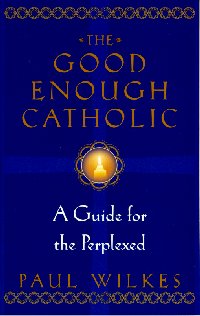The Good Enough Catholic, A Guide for the Perplexed
"A refreshing new way to look at the church of Rome."
Ballantine Books, 1996
ISBN 0-345-40962-0
My own feeling is that we just haven't yet figured out how to be Catholics at his transitional time in history.
Admittedly, this is not an easy task. Catholics are understandably unwilling to abandon the individuality they have struggled painfully to discover, only to return to a cookie-cutter approach to religious belief. Yet, on the other hand--as many a seeker has found--when that unique me is the centerpiece of worship, and the mystery of God has been shoved off to the side, a hollowness results.
This period we are in, I sense, marks a certain kind of Catholic spiritual adolescence--one beyond the time of complete parental constraint that marked the pre-Vatican II church, yet one terribly unsure of what is to be done with newfound freedoms. Whatever stage we may be experiencing, and however we may be able to articulate the current faith dilemma, the old and basic need for a divine presence in our lives has not gone away.
What we seek is a belief at once transcendently compelling and eminently practical—a true, reliable, and lasting light to illuminate our lives; a spiritual force to infuse our beings and inform our Judgments; a compass by which to set our course. We want something to help us live life and confront death, a way to shape our morality, a set of principles we can take into the bedroom as well as the boardroom—a faith that can weather our various trials, moods, and seasons. We yearn for a life rooted in, but not stunted by, religious tradition; a value structure that can wisely assay the worth and role of secular culture, yet preserve us from being enslaved by it.
In the midst of the social and religious turmoil that surrounds us, many Catholics simply walked away in frustration or marginalized themselves from their faith; indeed, an entire generation of Catholic-born children have been raised with little knowledge or understanding of the religious beliefs that shaped their parents and the American Catholic ethos. We are now witnessing the rise of the best secularly educated group of cradle Catholics ever born—and, religiously, the least literate. Their parents had a rich Catholic culture and faith as their foundation and guide—something to live by, return to, or continually rebel against. Their children, while calling themselves Catholic, have no such baseline. As Stephen Carter has argued in The Culture of Disbelief religion, once central to an individual's core identity and outlook, has been trivialized to the status of a hobby. God has become optional. Yet many Catholics today, sensing an emptiness in their lives, are reconsidering their attempt to opt for life without God. What once seemed like greater freedom now seems only deeper darkness.
A NEW CATHOLICISM
It is the premise of this book, and the conviction of its writer, that there is a Catholicism—a new kind of Catholicism—that is exactly right for this spiritually hungry, morally unsure, and self-reflective time. I think Catholicism, properly understood, offers a unique, total, satisfying, diverse approach to living, one far too valuable and tested to shun because of disagreements with certain of its teachings, or remembrance of pain inflicted.
